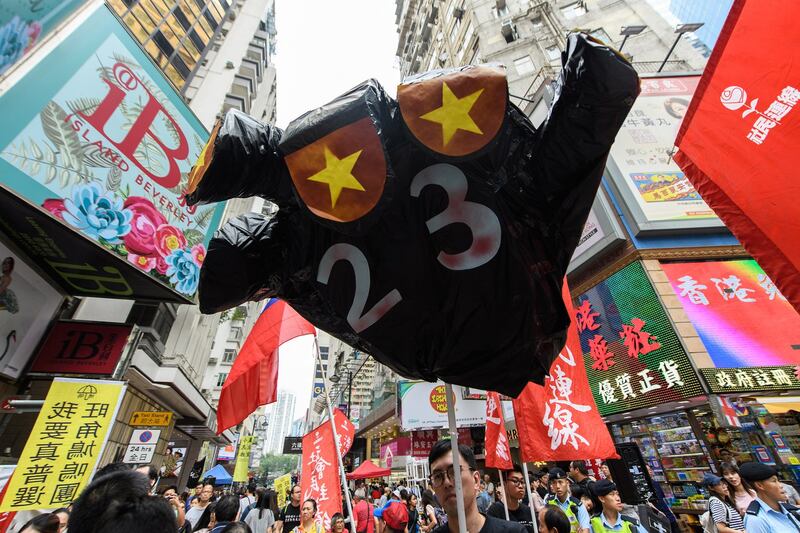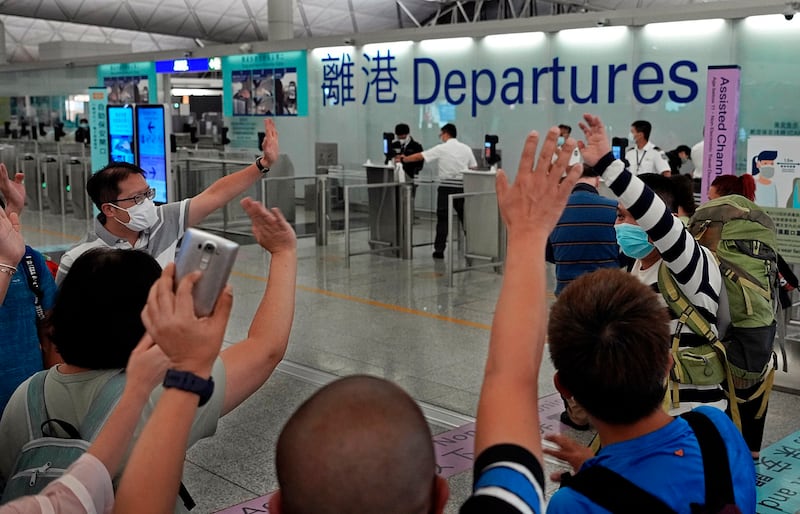The British government has loosened requirements for people wanting to emigrate from Hong Kong with their partner under the British National Overseas route to citizenship, which has already seen hundreds of thousands of Hong Kongers settle in the country amid a crackdown on dissent in the wake of the 2019 protest movement.
The move, which comes as the city's government gears up to introduce more sweeping security legislation, will potentially make it easier for people to bring their partners along when they apply to emigrate to the United Kingdom, according to the updated rules.
Now, holders of the British National Overseas, or BNO, passport can apply for a visa, which offers a pathway to residency and eventual citizenship, and bring their partners along, even if the couple is unmarried and doesn't live at the same address.
Previously, partners didn't need to be married but did need to prove two years' cohabitation before being eligible.
"If you’re not living together, they’ll need to prove that you have an ongoing commitment to each other, for example by providing evidence that you: communicate regularly with each other; support each other financially; care for any children you have together [and] spend time together as a couple, for example on holiday or at events,” according to the updated rules.
The rules recognise that cultural differences, or the demands of study or work, could make it impossible for partners to live together, according to the official government web page explaining the BNO visa process.
Article 23
The update comes amid growing anxiety in Hong Kong over the impact of forthcoming national security legislation under Article 23 of the Basic Law, which commentators say will likely expand the authorities' powers to arrest and charge people for actions that were once a normal part of their daily lives.
More than 10,000 people have been arrested and at least 2,800 prosecuted in a citywide crackdown in the wake of the 2019 protest movement, mostly under public order charges.

At least 230 arrests under the 2020 National Security Law, which criminalizes public criticism of the Hong Kong and Chinese governments, as well as ties and funding arrangements with overseas organizations deemed hostile to China.
A 26-year-old BNO passport-holder who gave only the nickname Alex for fear of reprisals said she plans to apply for the visa, and for her boyfriend, with whom she has been conducting a long-distance relationship for two years, to go to the United Kingdom with her.
She said the Article 23 legislation was a key reason for her decision.
"Whenever I talk to my family on the phone, they talk about how [my younger relatives] want to emigrate, and they all talk about the Article 23 legislation," she said. "They are more motivated to emigrate because of it."
She said the Hong Kong government's attempts to attract fresh talent to the city is also causing concern for many born and raised in the city.
"They are maybe a little worried about the economy and the talent plan, which could mean greater competition for jobs if they bring in more mainlanders," she said.
Faced with an exodus of middle-class families, fleeing ever-widening curbs on freedom of speech and growing political interference in schools, officials have been trawling the region for talent.
The city's population rose by more than 2% in August 2023, as more people are being allowed to settle there from elsewhere, and following the lifting of COVID-19 restrictions, officials said.
But there are other concerns for Alex.
"I believe in a free society, and many things are restricted [now]," she said. "I don’t want Hong Kong to be restricted like mainland Chinese.”
More interest likely
A case officer for the U.K.-based advocacy group Hong Kong Aid, who gave only the surname Chow for fear of reprisals, said his organization has received more than 100 enquiries from Hong Kongers wanting to bring their partners along on the BNO visa scheme since March 2021, including those wanting to know how to prove cohabitation.
He said the relaxation of the rules, which was announced on the third anniversary of the BNO visa program's launch, could encourage more people to apply for the scheme.
"This was a policy that needed to be reconsidered for many Hong Kongers," Chow told RFA in an interview. "It comes just as they are running the consultation for the Article 23 legislation."

"I think the crimes covered by the Article 23 legislation will further affect the rights and freedoms of Hong Kong people, and so we believe it will prompt more people, especially young people, to leave using various visa schemes including the BNO visa program," he said, adding that the issue is being widely discussed on social media.
The London-based rights group Hong Kong Watch said the new rules would make the scheme "more inclusive."
"We are delighted that the government has taken the step to further expand the BNO Visa for those brave young Hong Kongers who are not currently covered by the scheme, and to recognise the relationships that they have that may not be included in the current policy," Hong Kong Watch Chief Executive Officer Benedict Rogers said in a statement on the group's website.
"We welcome this step that will allow even more Hong Kongers to migrate to the UK and help those in need of a lifeline out of the city, be reunited with their loved ones, and make decisions as a family," he said.
To date, 191,000 people have applied to the BNO visa scheme, according figures from the British government.
Translated by Luisetta Mudie. Edited by Malcolm Foster.
